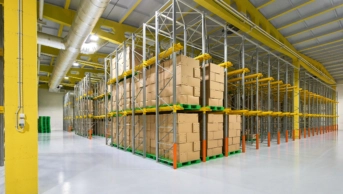
Alamy.com
“Unprecedented drug shortage linked to Brexit,” said the BBC. “Brexit information vacuum fuelling NHS drug shortages,” said Sky News. The mainstream media has been very quick to link the increasing number of medicines shortages in the UK with the seemingly endless drum beat of Brexit.
So much so, The Pharmaceutical Journal has received a number of calls from national journalists looking for a story connecting patients’ inability to access their medicines with the ongoing Brexit narrative.
Worsening medicines shortages are an undeniable reality for pharmacists across the UK, with the number of medicines on the generic concessions lists reaching a new peak of 96 in March 2019.
NHS Providers — the representative body for NHS Trusts — has warned that hospital trusts are also reporting a “sharp spike” in medicine shortages. But — despite the headlines — an unequivocal link between Brexit and medicines shortages has yet to be proven.
Ministers have failed to put forward regulations, potentially because there is so little parliamentary time available outside Brexit
Of course, the Department of Health and Social Care (DHSC) is keen to minimise any impact from its policy on Brexit, saying that there is no evidence to suggest current supply issues are related to the UK’s imminent exit from the EU. However, its insistence is somewhat undermined by rushing through new powers giving pharmacists the power to switch a prescribed medicine if it is in short supply “in the context of Brexit”.
What’s more, finding out impartial information has also been made more difficult by the veil of secrecy ministers have cloaked preparations, with trusts told to withhold Brexit impact assessments by the government.
The Pharmaceutical Services Negotiating Committee (PSNC) says it has received some anecdotal reports of stockpiling in parts of the supply chain and the ongoing political upheaval around Brexit may be exacerbating the medicines shortage situation by creating a “less attractive market for manufacturers”.
However, the PSNC also says that Brexit is just one factor at play; it told The Pharmaceutical Journal: “It is not possible to unpick the different factors [behind shortages] with any certainty.”
And this would fit with what, to date, is the best summary of the various factors behind the fractured medicines supply chain in the UK. Investigations from the National Audit Office and the Public Accounts Committee (PAC), published in June 2018 and October 2018, respectively, uncovered a series of factors, including the suspension of some manufacturers’ licenses, a decrease in the value of the British pound sterling, as well as highlighting an unexplained increase in wholesalers’ margins.
But the PAC ultimately placed the blame for the cost of medicines shortages on the DHSC, pointing out the department’s failure to mitigate the rising cost until five months after the price rises first began. It proceeded to request the DHSC’s plans on how ministers would use its price limiting powers to stop this happening again in the future.
Since then, the UK government has managed to halve the cost of the generic concessionary pricing scheme, by altering how prices are set. But this has been done on the backs of community pharmacists, as the price they are reimbursed is often well below the one they pay.
And, despite promising to do so, ministers have not yet tabled regulations to limit the price of generics — possibly as there is so little parliamentary time available outside Brexit.
Perhaps Brexit is not the overriding factor in medicines shortages, but could conversely be distracting ministers from progressing secondary legislation that could improve the situation. A disappointing vignette for the times we live in.


